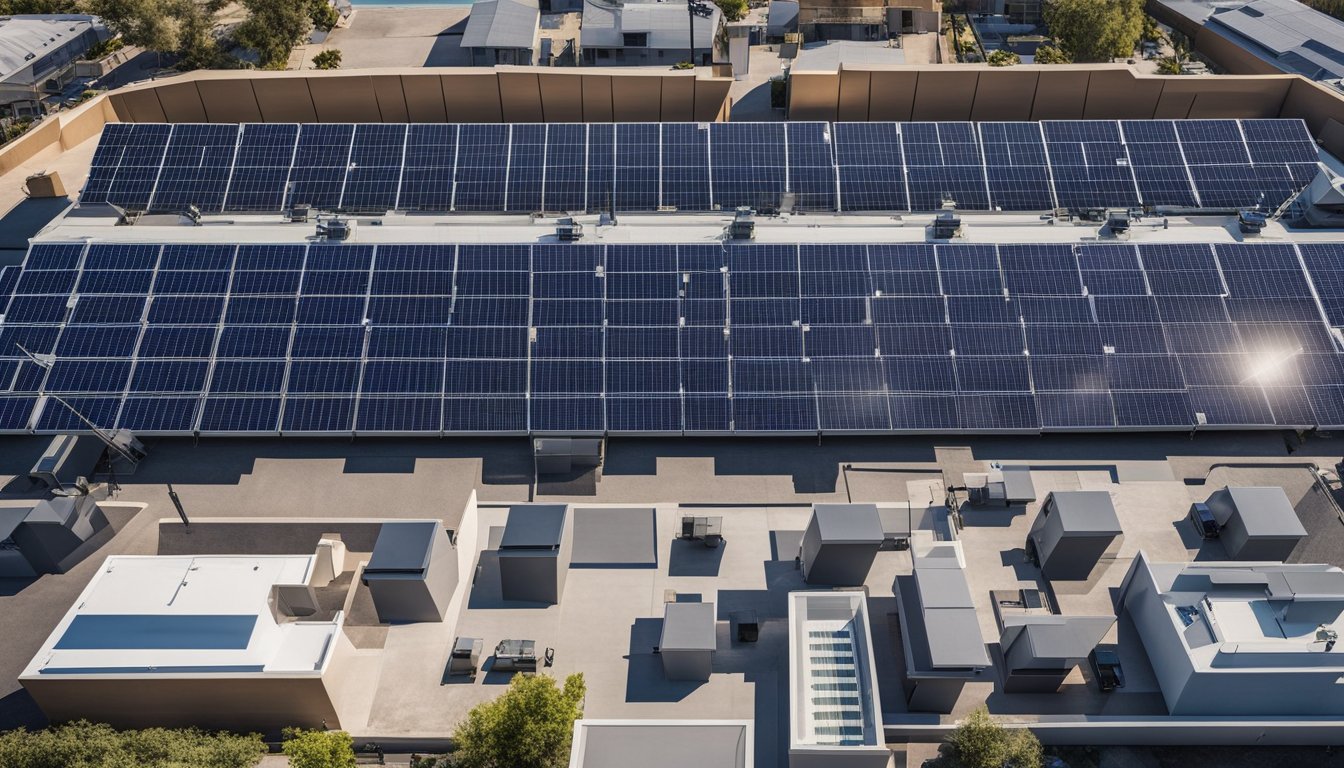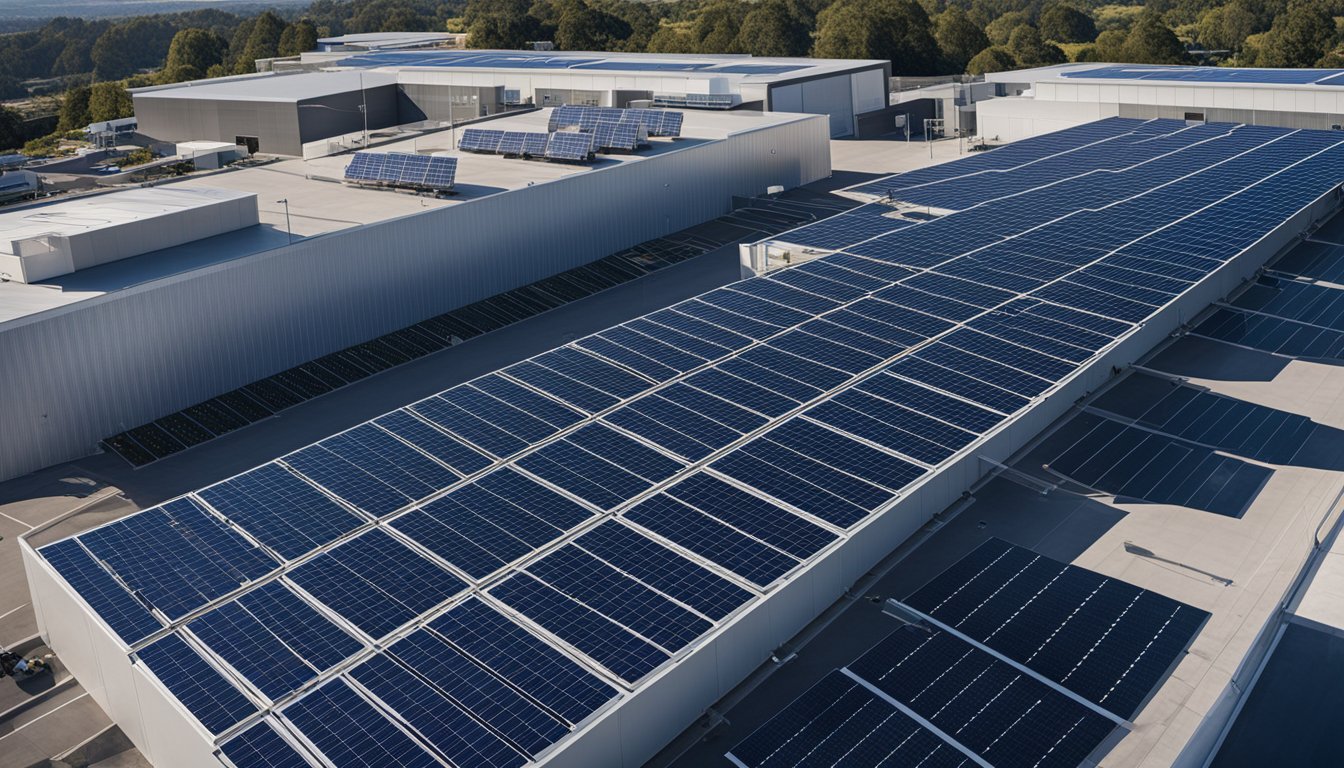Late updated: 18 Jul 2024 09:07
Written by: Amber Collins
Integrating Battery Storage With Solar Panels For Businesses: Maximising Energy Efficiency
Integrating battery storage with solar panels for businesses presents an innovative solution to maximise energy efficiency and sustainability. By combining solar energy with smart battery systems, businesses can store excess power generated during peak sunlight hours and utilise it when production is low or energy demand is high. This approach not only minimises reliance on the grid but also mitigates the impact of fluctuating energy prices, ensuring consistent electricity supply and operational continuity.

Businesses adopting this integration of solar and battery storage technology can experience substantial financial savings. The autonomous operation of these battery systems enables businesses to decrease their energy costs significantly. Additionally, this integration supports environmental responsibility by reducing the carbon footprint and promoting the use of renewable energy sources. The added benefit of backup power during outages further strengthens the case for this integration.
The environmental and economic advantages of solar and battery storage for businesses make it a valuable consideration. This combination offers a comprehensive energy solution that prioritises efficiency and sustainability. As businesses continue to seek ways to optimise their operations, integrating battery storage with solar panels stands out as a forward-thinking strategy.
Key Takeaways
- Integrating battery storage with solar panels maximises energy efficiency.
- Business costs are reduced through decreased reliance on the grid.
- Solar plus storage enhances both financial savings and sustainability.
Understanding Solar Energy Storage and Battery Systems
Integrating battery storage with solar panels provides businesses with a reliable and sustainable energy solution. We will explore the components and functionalities, types of solar batteries, and their compatibility with renewable energy sources.
Components and Functionality
A solar energy storage system is comprised of several key components: solar panels, batteries, an inverter, and a charge controller. The solar panels generate direct current (DC) electricity from sunlight. This electricity is then converted by the inverter into alternating current (AC), which powers our business operations.
Batteries store the excess energy produced during the day. This stored energy can be used when solar generation is low, such as at night or during cloudy weather. The charge controller manages the flow of electricity between the panels, batteries, and the grid, ensuring optimal charging and discharging cycles.
Understanding each component's role is vital for ensuring efficient solar energy storage and seamless business operations. Proper integration allows us to maximise energy usage and reduce reliance on grid power and fossil fuels.
Types of Solar Batteries and Their Applications
Several types of solar batteries can be utilised in our energy storage systems: lithium-ion batteries and lead-acid batteries are the most common. Lithium-ion batteries, known for their high energy density and longevity, are ideal for commercial use due to their durability and long lifespan.
Lead-acid batteries are more cost-effective but generally have a shorter lifespan and lower energy density. These may be suitable for smaller businesses or less intensive applications.
Selecting the appropriate type of battery is crucial. Factors to consider include energy demands, budget constraints, and the specific requirements of our business operations. For large-scale commercial battery storage, lithium-ion often presents the best long-term investment.
Compatibility with Renewable Energy Sources
Our solar battery systems must be compatible with various renewable energy sources to ensure maximum efficiency. Solar power can be paired not only with batteries but also with other renewable sources like wind and hydroelectric power.
Renewable energy sources offer multiple benefits, including reduced dependence on coal and natural gas. A well-integrated system can manage energy flow seamlessly, using solar power when available and switching to stored or alternative renewable energy as needed.
Ensuring compatibility between solar panels and battery storage systems with other renewable sources can further enhance our energy resilience. This integrated approach provides a more reliable and sustainable power supply for our business operations.
By understanding these key aspects, we can optimise our solar energy storage systems and make informed decisions that support sustainable growth.
Economic and Environmental Impact of Solar Plus Storage

Integrating battery storage with solar panels offers significant economic and environmental advantages for businesses. This solution not only reduces costs and enhances resilience but also supports sustainability and technological progress.
Financial Incentives and Cost Savings
Investing in solar plus storage systems can yield substantial financial benefits for businesses. Government incentives such as tax credits and grants often reduce initial costs. Demand charge reductions bring further savings by lowering electricity bills during peak usage times.
Businesses also benefit from energy savings by using stored solar power, reducing reliance on the grid. This financial relief can significantly shorten the payback period, making the investment more attractive. Commercial solar battery storage ultimately ensures ongoing cost savings and financial security.
Enhancing Business Resilience and Sustainability
Solar plus storage systems enhance business continuity by providing a reliable energy source during grid outages. This resilience is critical in maintaining operations without disruption. Additionally, adopting renewable energy sources aligns with corporate sustainability goals.
By reducing dependence on fossil fuels, businesses can lower their carbon footprint and contribute to combating climate change. This environmental stewardship not only benefits the planet but also enhances the company's brand image and satisfies stakeholders committed to sustainability.
Technological Advancements and Market Trends
The market for solar plus storage is continuously evolving, driven by innovations in storage technologies and solar energy production. Advancements in the Internet of Things (IoT) and artificial intelligence optimise battery management, improving efficiency and reducing costs.
Market trends indicate a growing adoption of these systems as businesses seek to embrace sustainable energy solutions. Staying informed about these trends is essential for businesses to take advantage of emerging technologies and investment opportunities. This proactive approach ensures competitiveness and alignment with future energy landscapes.
By integrating battery storage with solar panels, businesses not only achieve significant cost savings but also enhance their resilience and sustainability. The ongoing advancements in technology and market trends further underscore the viability and benefits of this energy solution.
Frequently Asked Questions

Integrating battery storage with solar panels offers businesses a way to maximise energy savings, enhance energy security, and reduce their carbon footprint. Below, we address some of the most common questions regarding the integration of battery storage with commercial solar panel systems.
What are the most cost-effective methods for storing solar energy for commercial use?
Lithium-ion batteries are currently the most cost-effective option for storing solar energy in commercial settings. They offer a good balance between cost, efficiency, and lifespan. Lead-acid batteries, while cheaper upfront, do not last as long and require more maintenance. Recently, flow batteries have emerged as a promising option for large-scale storage, although they are still relatively expensive.
How long can energy from solar panels typically be stored using current technology?
Using current lithium-ion battery technology, energy from solar panels can typically be stored for several hours to a few days, depending on the capacity of the battery system. Flow batteries, on the other hand, can store energy for longer durations, providing several days' worth of storage, which can be particularly beneficial for businesses with high energy demands.
What are the main disadvantages of using batteries for solar energy storage in a business context?
The initial cost of battery installation can be high, posing a significant upfront investment. Additionally, batteries degrade over time, reducing their storage capacity and requiring eventual replacement. Another concern is the space required for large battery systems, which might not be feasible for all business premises.
Is it possible to retrofit existing solar panel installations with battery storage solutions?
Yes, it is possible to retrofit existing solar panel installations with battery storage solutions. Many businesses start with solar panels and add battery storage later as their energy needs grow or as battery technology becomes more affordable. Retrofitting usually involves installing a new inverter compatible with battery systems and integrating the battery itself.
What are the various types of solar energy storage systems available for businesses today?
The primary types of solar energy storage systems available include lithium-ion batteries, lead-acid batteries, and flow batteries. Lithium-ion batteries are most common due to their efficiency and longer lifespan. Lead-acid batteries are typically cheaper but less efficient. Flow batteries, while still developing, offer longer storage durations and are suitable for larger-scale applications.
Are Tesla Powerwalls or similar products suitable for commercial energy storage requirements?
Tesla Powerwalls and similar products can be suitable for small to medium-sized businesses with moderate energy needs. They offer a reliable and scalable solution for storing solar energy. For larger commercial operations, more industrial-scale batteries might be required to meet higher energy demands effectively.
